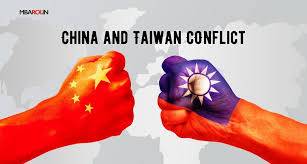The Looming Threat of a Taiwan-China Confrontation: A Global Economic Crisis in the Making?
The world is bracing itself for a potential showdown between China and Taiwan, with far-reaching implications for global stability and economic prosperity. As tensions escalate, the United States is faced with a daunting decision: how to respond to China's increasingly aggressive stance towards Taiwan, which Beijing claims as its own territory.
In a recent op-ed, Eyck Freymann and Hugo Bromley sounded the alarm, warning that a confrontation over Taiwan could trigger a global economic crisis of unprecedented proportions. "The implications are enormous," they wrote, "potentially including a global economic crisis far worse than the shock caused by the Covid-19 pandemic."
To understand the gravity of this situation, it's essential to grasp the complex dynamics at play. Taiwan, officially known as the Republic of China (ROC), has been self-governing since 1949, when the Nationalist Party (KMT) retreated to the island after losing the Chinese Civil War. However, the People's Republic of China (PRC) has always maintained that Taiwan is an integral part of its territory, and has threatened to use force to bring the island under its control.
In recent years, China's rhetoric and actions have become increasingly aggressive, with President Xi Jinping stating that Taiwan's reunification with the mainland is "inevitable." The Chinese military has also stepped up its military exercises and incursions into Taiwan's airspace and waters, prompting concerns about a potential invasion.
The United States has long maintained a policy of "strategic ambiguity" towards Taiwan, neither confirming nor denying its commitment to defend the island in the event of a Chinese attack. However, as China's aggression escalates, there are growing calls for the US to take a more decisive stance.
Freymann and Bromley argue that a US response to a Chinese invasion of Taiwan would need to be swift and decisive, involving a range of military, economic, and diplomatic measures. This could include imposing sanctions on China, providing military aid to Taiwan, and potentially even deploying US troops to the region.
However, such a response would also carry significant risks, including the potential for a wider conflict with China, which could have catastrophic consequences for the global economy. The Covid-19 pandemic has already shown us the devastating impact of a global crisis on trade, commerce, and economic stability.
In the event of a Taiwan-China confrontation, the global economy could face an even greater shock. China is the world's second-largest economy, and a conflict with the US and its allies could disrupt global supply chains, trigger a trade war, and send financial markets into turmoil.
As the world holds its breath, waiting to see how events will unfold, one thing is clear: the stakes are extremely high, and the consequences of a miscalculation could be catastrophic. It's imperative that all parties involved – China, the US, Taiwan, and the international community – work together to find a peaceful resolution to this crisis, before it's too late.
In conclusion, the looming threat of a Taiwan-China confrontation is a ticking time bomb, waiting to unleash a global economic crisis of unprecedented proportions. As the world teeters on the brink of this precipice, it's essential that we take a step back, assess the risks, and work towards a peaceful resolution that avoids the catastrophic consequences of a wider conflict. The stakes are high, but with diplomacy, dialogue, and a commitment to peace, we can still avoid the abyss.



No comments yet
Be the first to share your thoughts!